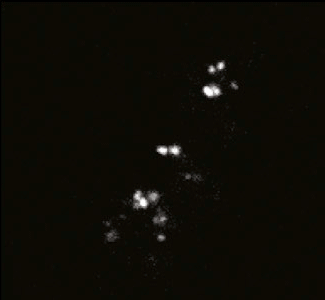New technology to make gRNA libraries for CRISPR/Cas9


CRISPR-Cas9 fluorescently tagged region of DNA in the nucleus of a living cell. source: BerkeleyNews
A research team from University of California at Berkeley has developed a technique that makes gene editing much easier and cheaper. Rebecca Heald has directed the work that enables making a guide RNA (gRNA) library by enzimatic processing from any DNA source, including a whole genome. The paper is accessible online in the Developmental Cell journal.
CRISPR/Cas is a prokaryote immune system that incorporates foreign DNA in its genome. After transcription of the incorporated DNA, RNA is processed into a guide RNA that binds Cas endonucleases and targets them to cleave alien, complementary DNA sequences. This acquired immunity mechanism was engineered as a gene editing tool by the Doudna lab, allowing to add and delete nucleotides to specific DNA loci in eukaryotes. This has a great potential in the treatment and discovery of genetic diseases. In their work, Heald and colleagues have designed a new endonuclease, dCas9-Neon, programmed to label repetitive chromosomal loci with a flourescent probe instead of cutting them. This will allow researchers to track a specific gene in a living cell, or even whole chromosomes during development.
Another very useful innovation is CRISPR-EATING – for “Everything Available Turned Into New Guides” – that allows to cheaply generate RNA guides from any DNA, covering even a whole genome. In their paper, the researchers made a 40000 gRNA library from E. coli‘s genome. CRISPR-EATING allows to target genomes that are not sequenced yet, making it very attractive for labs that work with less popular model organisms.
In CRISPR-EATING, RNAs are generated by PCR, then cut at the Protospacer Adjacent Motif (PAM), a sequence that follows the gRNA recognition sequence but is not in the gRNA site. Restriction enzymes trim the RNAs down to 20 base pairs, which are finally incorporated into the CRISPR/cas9 complex.
Source: Berkeley News



